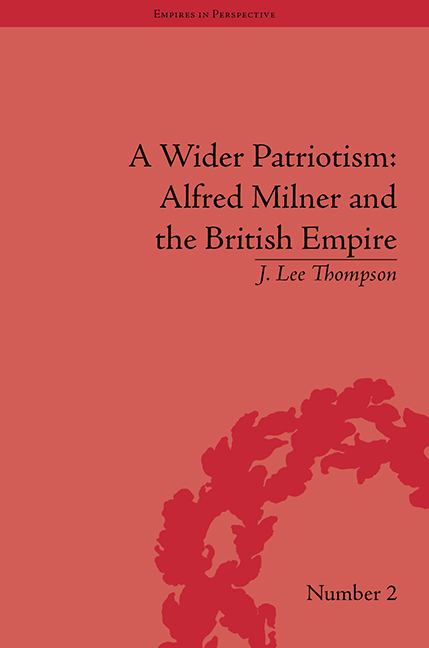Book contents
- Frontmatter
- CONTENTS
- Preface
- Acknowledgments
- Part I A Question about Which I Have Never Been Able to See the Other Side
- 1 Introduction
- 2 Imperial Propagandist: The Press, Politics and Public Opinion
- 3 Cromer and Egypt
- Part II Civilian Soldier of the Empire: South Africa
- Part III Constructive Imperialism
- Part IV Imperialism on the Anvil
- Notes
- Works Cited
- Index
3 - Cromer and Egypt
from Part I - A Question about Which I Have Never Been Able to See the Other Side
- Frontmatter
- CONTENTS
- Preface
- Acknowledgments
- Part I A Question about Which I Have Never Been Able to See the Other Side
- 1 Introduction
- 2 Imperial Propagandist: The Press, Politics and Public Opinion
- 3 Cromer and Egypt
- Part II Civilian Soldier of the Empire: South Africa
- Part III Constructive Imperialism
- Part IV Imperialism on the Anvil
- Notes
- Works Cited
- Index
Summary
In November 1889 Milner arrived in Cairo to take up his duties as Director-General of Accounts for the Khedive Tewfik. He succeeded Elwin Palmer, who was promoted to the position of Financial Advisor when Sir Edgar Vincent (later Lord D'Abernon) resigned to become Governor of the Imperial Ottoman Bank at Constantinople. As Director-General of Accounts, Milner was the number three man in the Egyptian Ministry of Finance, under Palmer and Julius Blum, an Austrian banker who was Under-Secretary of State. The Director-General, Milner explained to George Goschen, was a great deal more than an Accountant-General, he was the Treasury and Controller-General ‘rolled into one plus any number of delicate miscellaneous duties, appointments, pensions … heaped upon him for want of anybody else, to whom they could be conveniently entrusted’. He told Goschen that he found the position ‘a more important place than I imagined when I took it, as far as the internal administration of Egypt is concerned’. But, if on the administrative side the position was a very big one, Milner complained that it was ‘politically nil’.
By the time Milner arrived, Sir Evelyn Baring (created Baron Cromer in 1892) had been British Agent and Consul General in Cairo for six years and, with the help of Vincent's financial wizardry, had got Egypt through the worst of her debt crisis, which Milner called the ‘Race against Bankruptcy’. The Egyptian Government's freedom of action was circumscribed by an 1880 Law of Liquidation (amended at the 1885 Conference of London) which placed her finances in the hands of foreigners, who had in addition been granted special capitulary rights including extra-territorial status in regard to most Egyptian laws. An international body, the Caisse de la Dette Publique, had been created after the bankruptcy crisis of 1876 to regulate Egypt's finances and to represent European bondholders. Roughly half of Egypt's yearly income was given over to the Caisse to pay the debt, made up of several different loan arrangements.
- Type
- Chapter
- Information
- A Wider PatriotismAlfred Milner and the British Empire, pp. 24 - 36Publisher: Pickering & ChattoFirst published in: 2014

